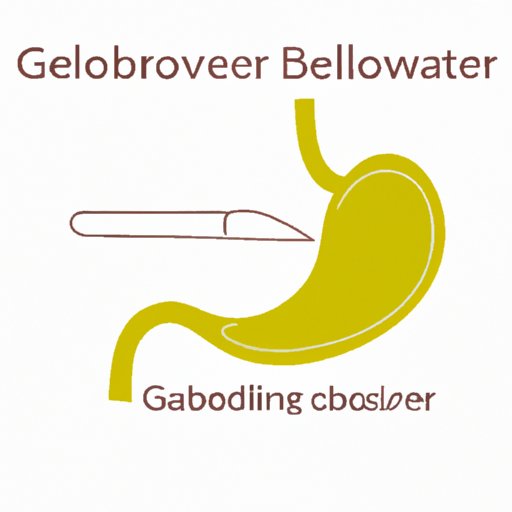
Introduction
The gallbladder is an integral part of our digestive system that plays a vital role in digestion. Unfortunately, some people may develop conditions that require the removal of their gallbladder, leaving them wondering if living without it is possible. If you’re one of the many people who are curious about life without a gallbladder, this article is for you.
The Pros and Cons of Living Without a Gallbladder: Is It Possible to Thrive Without One?
Living without a gallbladder is possible, but it does come with some pros and cons. One of the most significant benefits of not having a gallbladder is that you’ll no longer experience gallstones, which are painful and can lead to complications. However, living without a gallbladder can also cause issues with digestion, such as diarrhea, bloating, and abdominal discomfort.
Real-life stories of people living without a gallbladder can help you understand what to expect. Many people report having no long-term issues and are happy with their decision to have their gallbladder removed. However, others may experience ongoing digestive issues that can impact their quality of life. It’s important to understand that every person’s experience is unique, and it’s impossible to predict how you’ll feel after surgery.
Understanding the Function of the Gallbladder: Do We Really Need It?
The gallbladder is a small organ located beneath your liver. Its primary function is to store and release bile, which is a digestive fluid that helps break down fats in your small intestine. Bile is produced continuously by your liver, but it’s stored and concentrated in your gallbladder between meals.
While we can survive without a gallbladder, it does play an essential role in our digestive system. Without a gallbladder, your liver will continue to produce bile, but it won’t be stored and concentrated. This can lead to digestive issues because fats won’t be broken down as efficiently.
According to the American College of Gastroenterology, approximately 700,000 cholecystectomies (gallbladder removal surgeries) are performed each year in the United States. The most common reason for gallbladder removal is the development of gallstones that cause pain or other complications.
Gallbladder Removal Surgery: What Happens After?
If you need to have your gallbladder removed, you’ll undergo a procedure called a cholecystectomy. The most common type of cholecystectomy is laparoscopic surgery, which involves making several small incisions in your abdomen and using a tiny camera and surgical instruments to remove your gallbladder.
While cholecystectomy is a safe and routine surgery, all surgeries come with some potential risks, such as infection, bleeding, and damage to nearby organs. After surgery, you’ll need to take it easy and avoid strenuous activity for a few weeks. Your doctor will also give you guidelines on resuming your regular diet and activities.
Debunking the Myths: Separating Fact from Fiction about the Role of the Gallbladder
There are many myths about the gallbladder and its function. One of the most common is that you can’t digest fat without a gallbladder. This isn’t true – you can still digest fat without a gallbladder, but it may take your body longer to break it down, leading to digestive issues.
Other common myths include that gallbladder removal will lead to weight gain or that you’ll need to take bile salts supplements for the rest of your life. While weight gain is possible after gallbladder removal, it’s not a guarantee, and bile salt supplements are not usually necessary in the long term.
Living a Healthy Life Without a Gallbladder: Tips and Tricks
If you’ve had your gallbladder removed, there are several dietary and lifestyle modifications that may help ease digestion and avoid discomfort. These include:
- Eating smaller, more frequent meals
- Avoiding high-fat foods, spicy foods, and caffeine
- Including fiber-rich foods in your diet
- Staying hydrated
- Avoiding tobacco and excessive alcohol consumption
Physical activity can also help promote healthy digestion and reduce the risk of complications, such as blood clots. Consult with your doctor before starting any new exercise program to ensure that it’s safe for you.
What to Expect When You No Longer Have a Gallbladder: Possible Risks and Benefits
Gallbladder removal can have both short-term and long-term effects on your digestion, nutrient absorption, and overall health. While the immediate risks associated with cholecystectomy are relatively low, such as infection and bleeding, some people may experience long-term issues with digestion, such as diarrhea and bloating.
On the positive side, living without a gallbladder reduces the risk of developing gallstones, which can be painful and lead to further complications. However, it’s essential to consult with your doctor to weigh the potential risks and benefits of gallbladder removal and decide on the best course of action for your particular situation.
Conclusion
In conclusion, the gallbladder is an essential part of our digestive system, and living without one is possible but can come with some challenges. If you’re considering gallbladder removal or have already had your gallbladder removed, it’s crucial to understand what to expect and how to optimize your digestive health.
Consult with your doctor to make informed decisions about your gallbladder health and seek medical advice when necessary. With some dietary modifications and lifestyle changes, you can live a fulfilling life without a gallbladder.




